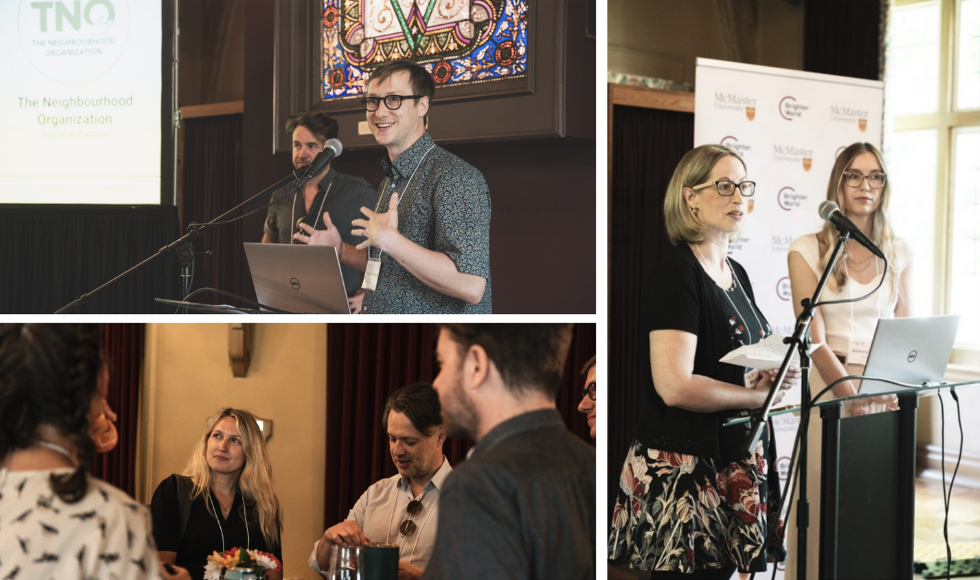Researchers awarded $85,000 for research collaborations with local organizations

A celebration at Alumni Memorial Hall honoured the winners of McMaster’s inaugural Societal Impact Seed Grant competition. Attendees had a chance to learn more about the awardees’ projects and connect with fellow Faculty and community members who are advancing research with impact.
BY Daniella Fiorentino, Office of the VP Research
June 13, 2024
Five McMaster researchers have been awarded a combined $85,000 through the inaugural Societal Impact Seed Grant competition.
The researchers will each collaborate with a societal partner to generate and mobilize co-created knowledge that helps solve a societal challenge.
Supported by the Office of the Vice-President, Research, the grant is designed to drive meaningful campus-society collaborations across the disciplines.
The recipients’ work is proof of the powerful role research plays in creating positive social change at the community level, says McMaster’s Associate Vice-President, Research (Society & Impact), Sukhvinder Obhi, who created the awards program.
“Congratulations to our inaugural Societal Impact Seed Grant winners,” says Obhi. “By partnering with leading local organizations, McMaster researchers are mobilizing their work to tackle pressing societal issues – including healthcare and aging, cybersecurity, pollution and the environment — to improve lives and build healthier communities.”
Learn more about the grant recipients and their projects:
Michelle Phoenix, School of Rehabilitation Science | $20,000
 Disabled children and families who are newcomers to Canada face multiple barriers when accessing health care services, such as out-of-pocket expenses, communication barriers, stigma and transportation limitations.
Disabled children and families who are newcomers to Canada face multiple barriers when accessing health care services, such as out-of-pocket expenses, communication barriers, stigma and transportation limitations.
Michelle Phoenix and the CanChild Centre for Childhood Disability Research have partnered with SMILE Canada to develop co-created solutions and resources that can be used to improve culturally responsive health care services for newcomer children with disabilities and their families.
Andrea Zeffiro, Department of Communication Studies & Media Arts |$20,000
 Andrea Zeffiro has partnered with the Sex Workers’ Action Program (SWAP) to support community building and knowledge exchange amongst sex workers in Hamilton on the topics of cyber security risks, threats and mitigation strategies.
Andrea Zeffiro has partnered with the Sex Workers’ Action Program (SWAP) to support community building and knowledge exchange amongst sex workers in Hamilton on the topics of cyber security risks, threats and mitigation strategies.
The partners aim to produce a zine-based workshop model that could be used by other underrepresented groups to document and educate about group-specific cybersecurity and safety needs.
Wenonah Campbell, School of Rehabilitation Science | $15,000
 Wenonah Campbell has partnered with the Ontario Society of Occupational Therapists (OSOT) to co-create a continuing professional development program that helps OTs navigate and address inequities in tiered service delivery models.
Wenonah Campbell has partnered with the Ontario Society of Occupational Therapists (OSOT) to co-create a continuing professional development program that helps OTs navigate and address inequities in tiered service delivery models.
The project aims to set a clear path toward supporting school-based OTs across Ontario in enacting equitable delivery of tiered services for all children.
Alexander Hall, School of Interdisciplinary Science | $15,000

Alexander Hall has partnered with The Neighbourhood Organization (TNO) to generate new programs, services, policies and public health communication strategies geared towards solving holistic health challenges facing Canada’s aging population in racialized, equity-deserving neighbourhoods.
The team will develop unique, culturally specific communication strategies to make local residents, especially those living in isolation, aware of new and existing programs and services through TNO community hubs.
Sarah Styler, Department of Chemistry & Chemical Biology | $15,000
 Hamilton air quality is significantly influenced by industrial emissions, which manifest in various ways that can be of particular concern to residents, such as dustfall or the “grime” that Hamiltonians can find on outdoor surfaces throughout the year.
Hamilton air quality is significantly influenced by industrial emissions, which manifest in various ways that can be of particular concern to residents, such as dustfall or the “grime” that Hamiltonians can find on outdoor surfaces throughout the year.
Sarah Styler has partnered with Environment Hamilton to develop a high-resolution picture of dustfall quantity and composition across the city, with the aim of improving air quality monitoring, facilitating public engagement sessions on the results of the study, and sharing best practices for reducing exposure to dustfall.


